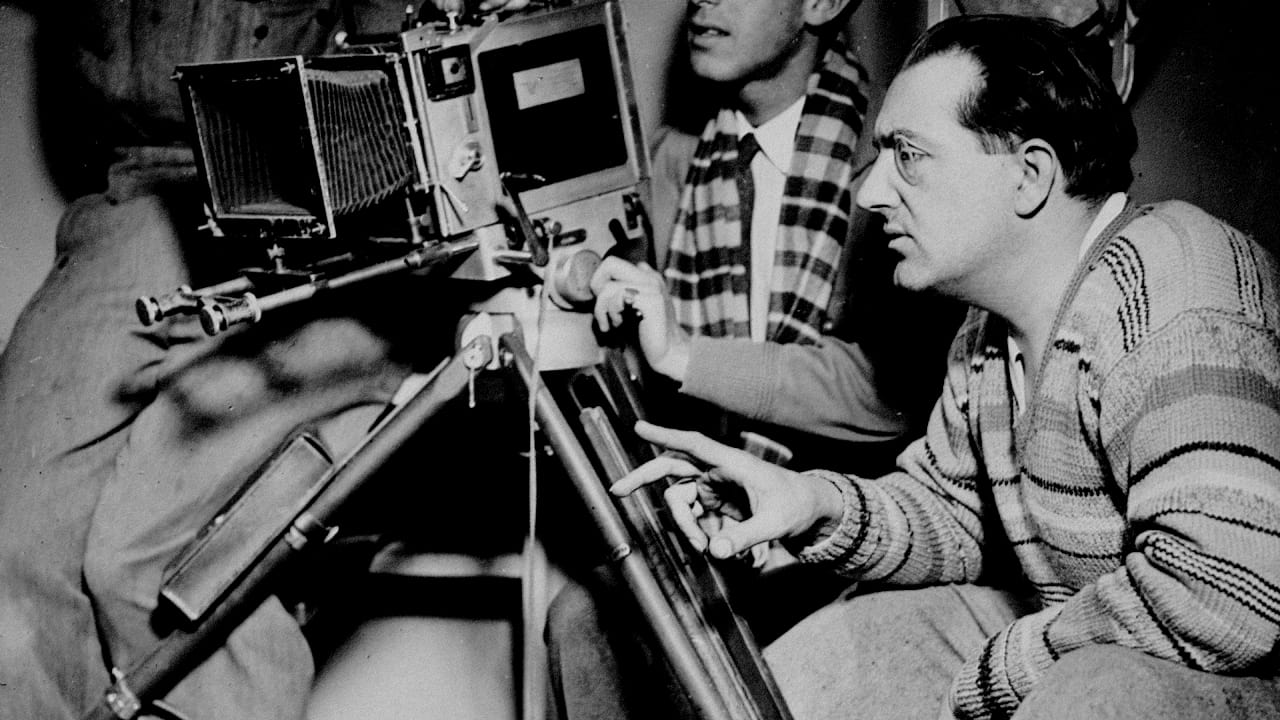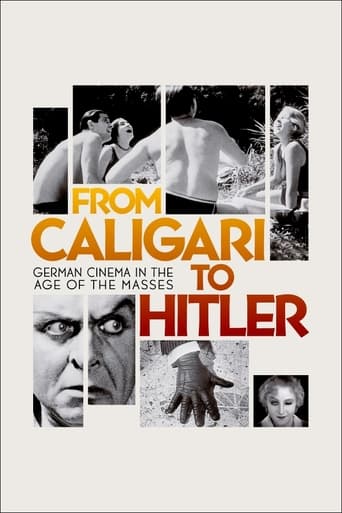Incannerax
What a waste of my time!!!
StyleSk8r
At first rather annoying in its heavy emphasis on reenactments, this movie ultimately proves fascinating, simply because the complicated, highly dramatic tale it tells still almost defies belief.
Rio Hayward
All of these films share one commonality, that being a kind of emotional center that humanizes a cast of monsters.
Nicole
I enjoyed watching this film and would recommend other to give it a try , (as I am) but this movie, although enjoyable to watch due to the better than average acting fails to add anything new to its storyline that is all too familiar to these types of movies.
dex_90
You'll get to see amazing pictures of 1920s and 30s Berlin and Germany and get to know a few influential movies of the Weimar Republic period of German cinema along with some less known examples in the latter half. Unfortunately the basis for the documentary and narration is based on Siegfried Kracauer's book "From Caligari to Hitler: A Psychological History of the German Film" published in 1947, which is filled with Postmodernist gibberish and sociologist analysis and interpretation through a decidedly Frankfurt School lens describing the time period, directors, other people involved and the movies, often even self-contradictorily so. A few of the interviewees picked also don't seem to hold any deeper insights into the time period and it's questionable what they add to the documentary or for what reason they were chosen.
Horst in Translation (filmreviews@web.de)
"Von Caligari zu Hitler" is an award-winning German documentary movie from 2014, so still a relatively new work written and directed by Rüdiger Suchsland based on the book by Siegfried Kracauer. The title already gives away that this almost 2-hour movie focuses on the Weimar Republic ("From Caligari to Hitler: German Cinema in the Age of the Masses") and the impact that the films made during that period had on Germany, but also the impact of politics and society on German films during these 15 years. I must say I am normally skeptical when a filmmaker narrates his own documentary. Not everybody is Werner Herzog. But after a brief moment of adjusting to Suchsland's voice, I quite liked what I heard. I also believe it was a good idea to use a second narrator for quotes taken directly out of the book this is based on. What is especially impressive is that it was Suchsland's very first directorial effort and that is really a start that not even most of the greats managed. Despite having seen many German (silent) films from that era, I must say that I did not end up liking too many of these. The good thing, however, is that this had no impact on my perception of this one here. It was an interesting watch from start to finish and I believe the filmmaker managed a convincing study. I also think you don't need to have great political knowledge about that time to enjoy the watch. My interest for example does not really start before 1933 either. And you probably do not need to have seen (m)any of the films referenced in here to enjoy it. It's a really educational work that never drags and I would definitely call it one of the best examples of film on film documentaries I have ever seen. From a very personal perspective I must say it was extraordinary to see these people that are long dead and to wonder how life (i.e. war a.o.) shaped them not just before they were recorded, but also afterward, especially when you watch them in a simple moment harmlessly enjoying themselves. The director did a great job in making a connection between me as an audience member and the people you see in here. And to end my review, I would like to make a statement on the closing credits fittingly as it somewhat broke my heart to see all the names of these creative people at the very end and read after each and every name that they left Germany before/when the Nazi party took over. Oh what could have been in terms of Germany being a defining filmmaking country for decades to come. Please watch this documentary. Highly, highly recommended and criminally underseen.
Michael_Elliott
From Caligari to Hitler: German Cinema in the Age of the Masses (2014)*** 1/2 (out of 4) Entertaining documentary that explores German cinema before Hitler came into play. The Weimar Republic is looked at from the span of 1919-1933 and we hear about countless careers including Fritz Lang, F.W. Murnau, Georg Wilhelm Pabst, Ernst Luitsch, Marlene Dietrich, Billy Wilder and Robert Wiene among others.If you're a fan of German cinema then you'll certainly want to watch this documentary that clocks in just under two hours. There are a lot of clips from various movies shown but we also get interviews with some German historians who discuss these films and their impact around the world. I will admit that some of the narration seemed to try and be "too intelligent" by throwing certain thoughts out there that just didn't really fit with the films.With that said, there's no question that this gives you a terrific look at German cinema during this period and there are some theories that if you view these films they give you an idea into the mindset of German's and they might explain why Hitler rose to power. Certainly some interesting things to think about. FROM CALIGARI TO Hitler is certainly worth watching.
blanche-2
We owe so much to the Germans in terms of films. So many techniques used over there, the lighting, the shadows, the dark ambiance, we owe to them, in large part because many of their filmmakers fled Germany circa 1933.I found this a little heavy going but quite good. Through film clips and interviews, the documentary tells us about German cinema at a time during the free Weimar period, the golden era of which was 1924-1929. This was a time of stable economy, culture renaissance, and new ideas. Women were more Americanized, the cabarets and musicals were popular.The documentary begins after World War I where there was great upheaval. Siefried Kracauer wrote 'From Caligari to Hitler' in 1947, on which this documentary is based. We see all the great Weimar directors: the versatile Fritz Lang, G.W. Pabst, F. W. Murnau, Ernst Lubitsch, the Siodmak brothers, and writers, Billy Wilder being one. And we see their stars: Dietrich, Emil Jannings, Louise Brooks, Lilian Harvey, Willy Fritsch (Harvey and Frisch were known as the "dream couple" in film), and even Leni Riefenstahl, who appeared in what are known as "mountain movies." And there are clips from the classics: "Metropolis" (1927), "The Cabinet of Dr. Caligari" (1920), "M" (1931), "Nosferatu" (1922), "People on Sunday" (1930), and "Berlin, Symphony of a Metropolis" (1927). Kracauer's thesis, gone into here, was that the films predict the rise of the National Socialist Party as well as the stock market crash (in several films, before 1929, the stock market crashes). is that the budding film industry predicted the coming of the National Socialist Party. Many films had megalomaniacs or evil men, and mob order.It is a fascinating thesis and probably true. I think it might not be just German films."Why We Fight" in 1933, predicted WW II and during a demonstration, one sees a swastika and a Japanese sun. Also, if one remembers, when The China Syndrome came out, nuclear power executives lambasted the picture as being "sheer fiction" and a "character assassination of an entire industry". Then twelve days after the movie's release, the Three Mile Island nuclear accident occurred. 'Arlington Road' from 1999 focuses on the idea of how much we actually know about our neighbors. The central theme is the threat of homegrown terror, but it's built around the notion of what we view as plausible vs. implausible. In a pre-9/11 world, the film serves almost as a cautionary tale. It was dismissed as preposterous.And don't forget, the Simpsons did an episode about "President Trump" in 2000. Those are films dealing with specific instances, but I'm sure if one goes back and studies films from the past, there are themes that became relevant later.If it's in the air, it's in the air. Fascinating nonetheless.

